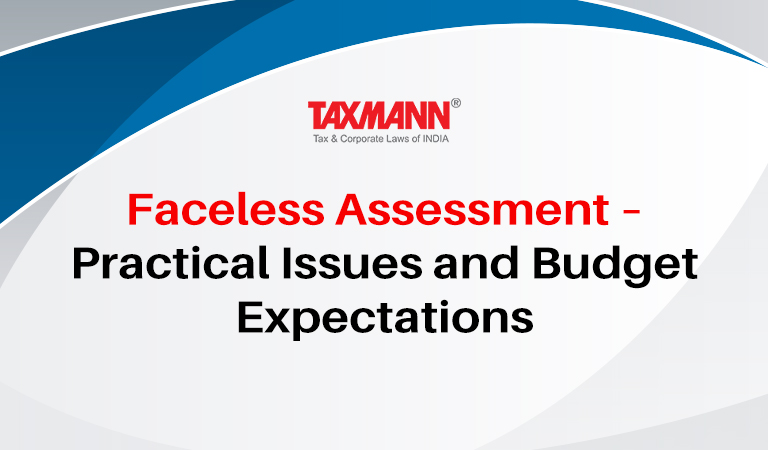Faceless Assessment – Practical Issues and Budget Expectations
- Blog|News|Income Tax|
- 2 Min Read
- By Taxmann
- |
- Last Updated on 11 February, 2022

Sudeep Das & Ashwath Pai – [2022] 134 taxmann.com 235 (Article)
The Prime Minister of India launched the platform of “Transparent Taxation – Honouring the Honest”, during August ’20, which presented major reforms including a new version of Faceless Assessment in the Income Tax Act, 1961 (ITA). Traditionally, scrutiny proceedings involved a face-to-face meeting with the tax officer, providing details, multiple visits to the tax office and interminable waiting. The scheme has been introduced with the intention of making entire direct tax administration faceless and taxpayer friendly.
India is one of the first countries to implement such a system of conducting tax assessments. Over the last several years, the Indian government has taken tangible steps to shift its image from an aggressive tax jurisdiction to one that is welcoming taxpayers and investors.
It is worthwhile to note that though faceless assessments are a step in the right direction, there are many practical issues/ challenges still being faced by the industry, which warrants attention.
This article discussed a few of the practical issues along with implementable suggestions.
Click Here To Read The Full Article
Taxmann’s Budget 2022-23 is an imprint edition of the Union Budget, as presented by the Finance Minister in the Parliament. It covers everything you need to decipher the changes proposed by the Finance Bill, 2022. It consists of Budget Highlights, the Finance Minister’s Speech, the Finance Bill, the Memorandum Explaining the Provisions of the Finance Bill, and the Notes on Clauses.
Click Here to Book The Budget 2022-23 NOW!
Check out Budget Marathon | Taxmann's one-of-a-kind Webinar for the Union Budget 2022-23
Disclaimer: The content/information published on the website is only for general information of the user and shall not be construed as legal advice. While the Taxmann has exercised reasonable efforts to ensure the veracity of information/content published, Taxmann shall be under no liability in any manner whatsoever for incorrect information, if any.

Taxmann Publications has a dedicated in-house Research & Editorial Team. This team consists of a team of Chartered Accountants, Company Secretaries, and Lawyers. This team works under the guidance and supervision of editor-in-chief Mr Rakesh Bhargava.
The Research and Editorial Team is responsible for developing reliable and accurate content for the readers. The team follows the six-sigma approach to achieve the benchmark of zero error in its publications and research platforms. The team ensures that the following publication guidelines are thoroughly followed while developing the content:
- The statutory material is obtained only from the authorized and reliable sources
- All the latest developments in the judicial and legislative fields are covered
- Prepare the analytical write-ups on current, controversial, and important issues to help the readers to understand the concept and its implications
- Every content published by Taxmann is complete, accurate and lucid
- All evidence-based statements are supported with proper reference to Section, Circular No., Notification No. or citations
- The golden rules of grammar, style and consistency are thoroughly followed
- Font and size that’s easy to read and remain consistent across all imprint and digital publications are applied



 CA | CS | CMA
CA | CS | CMA
